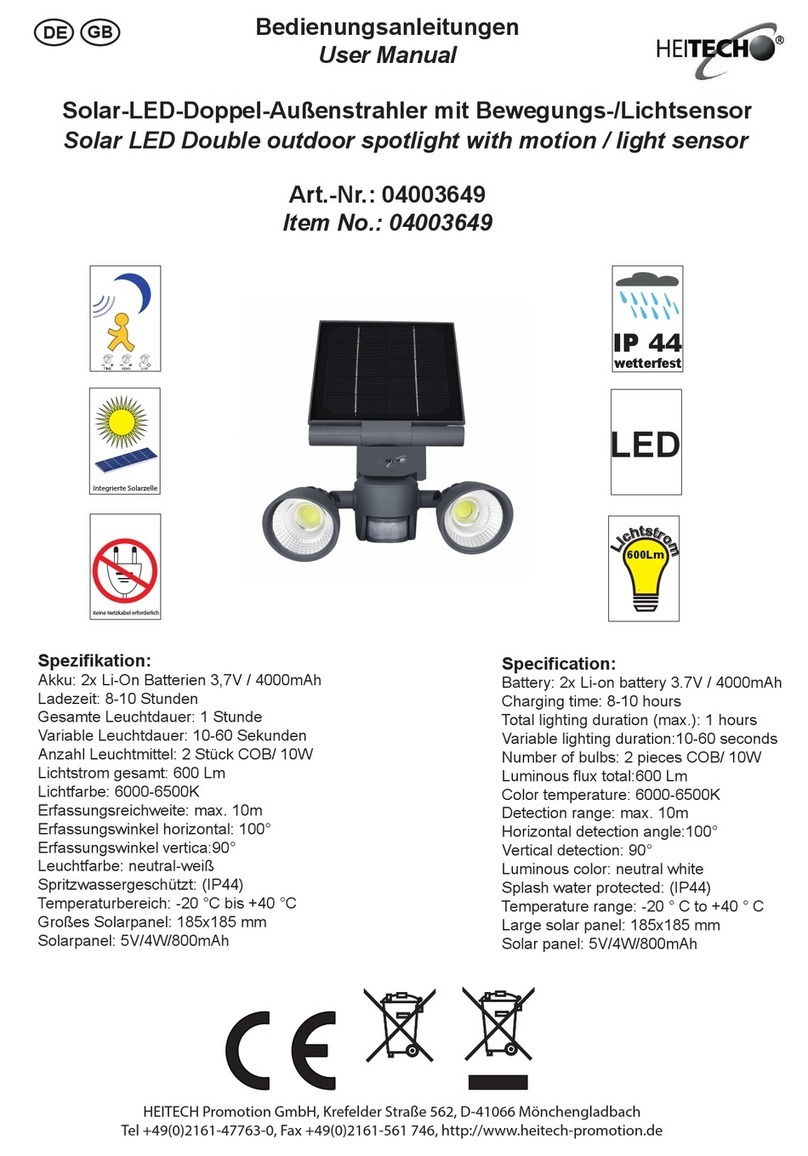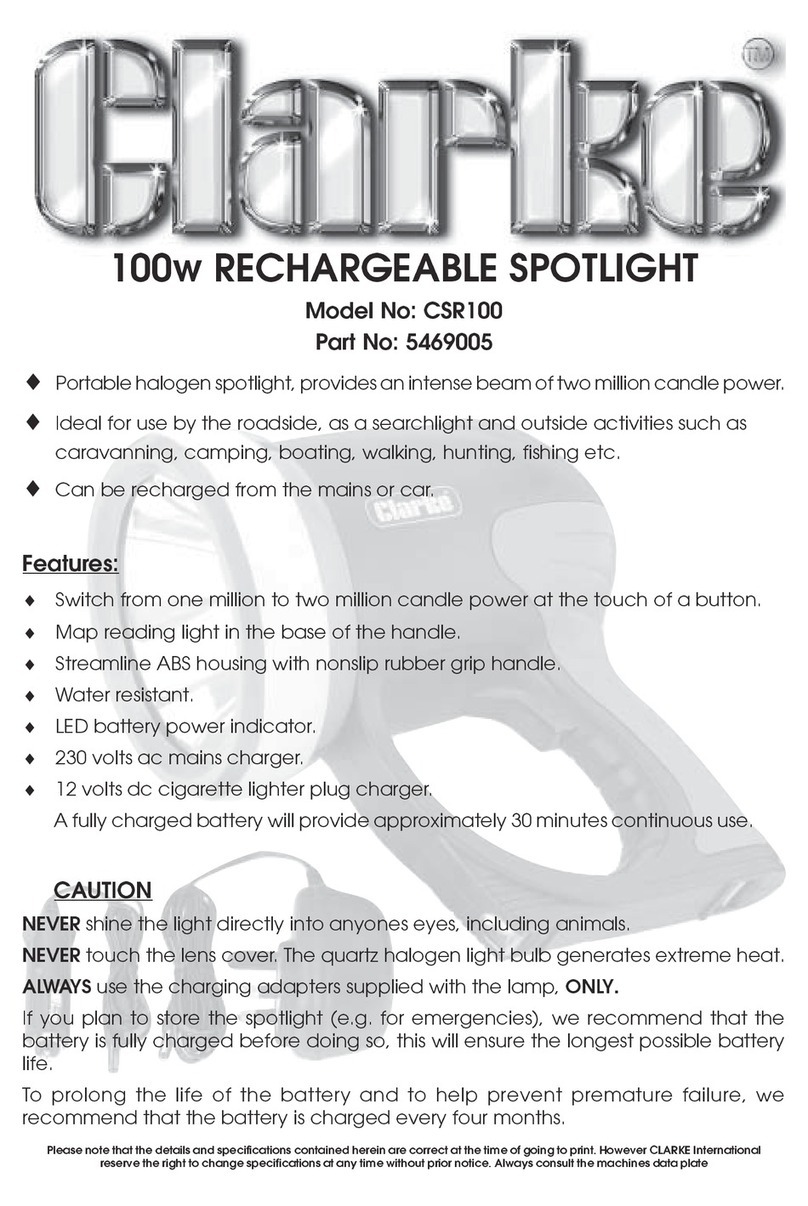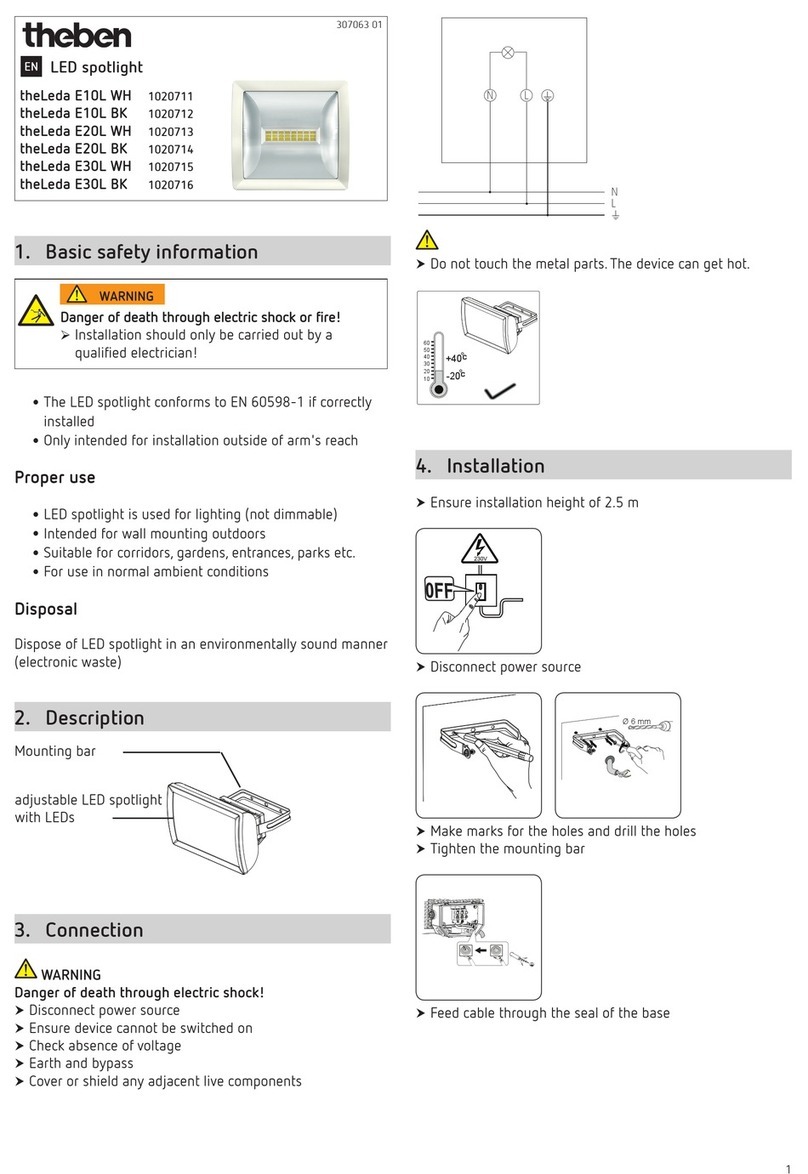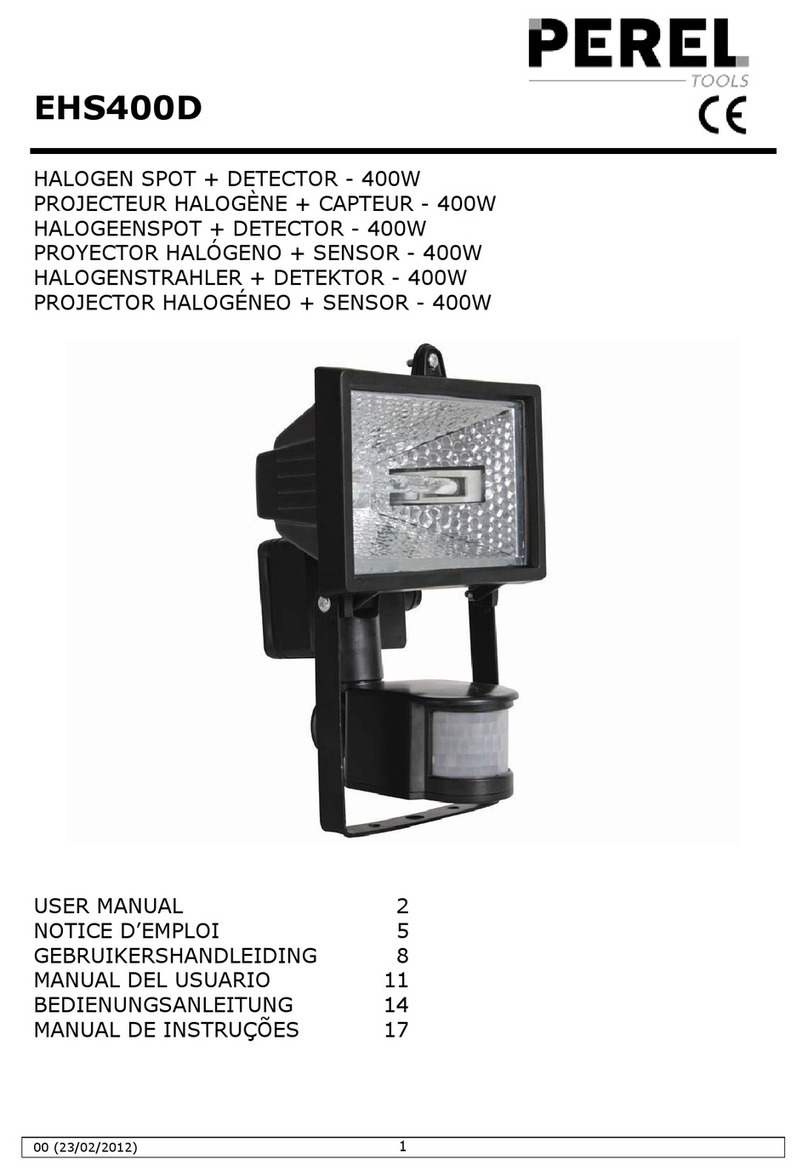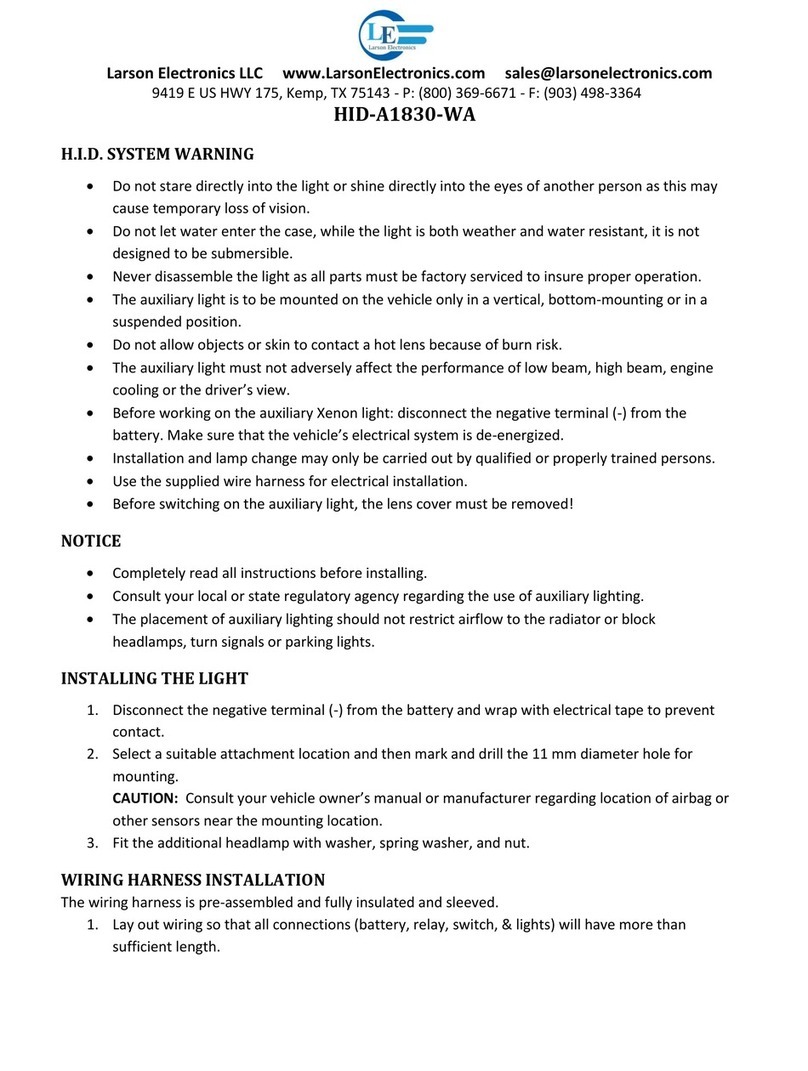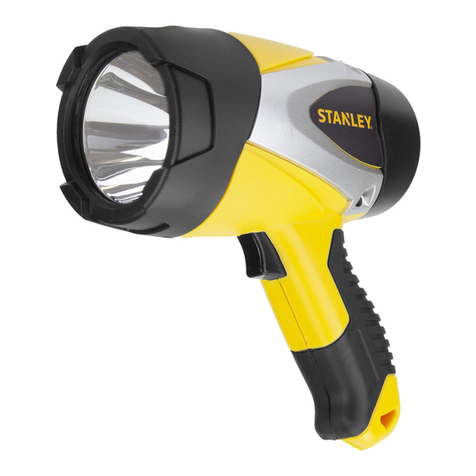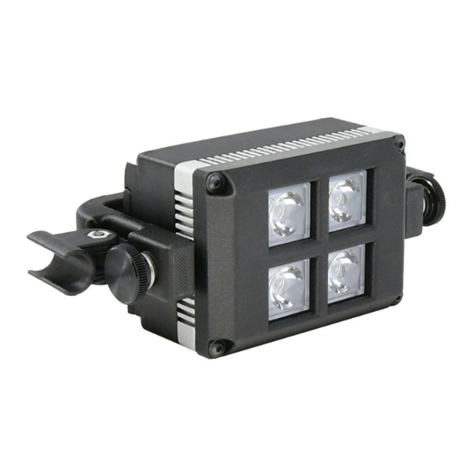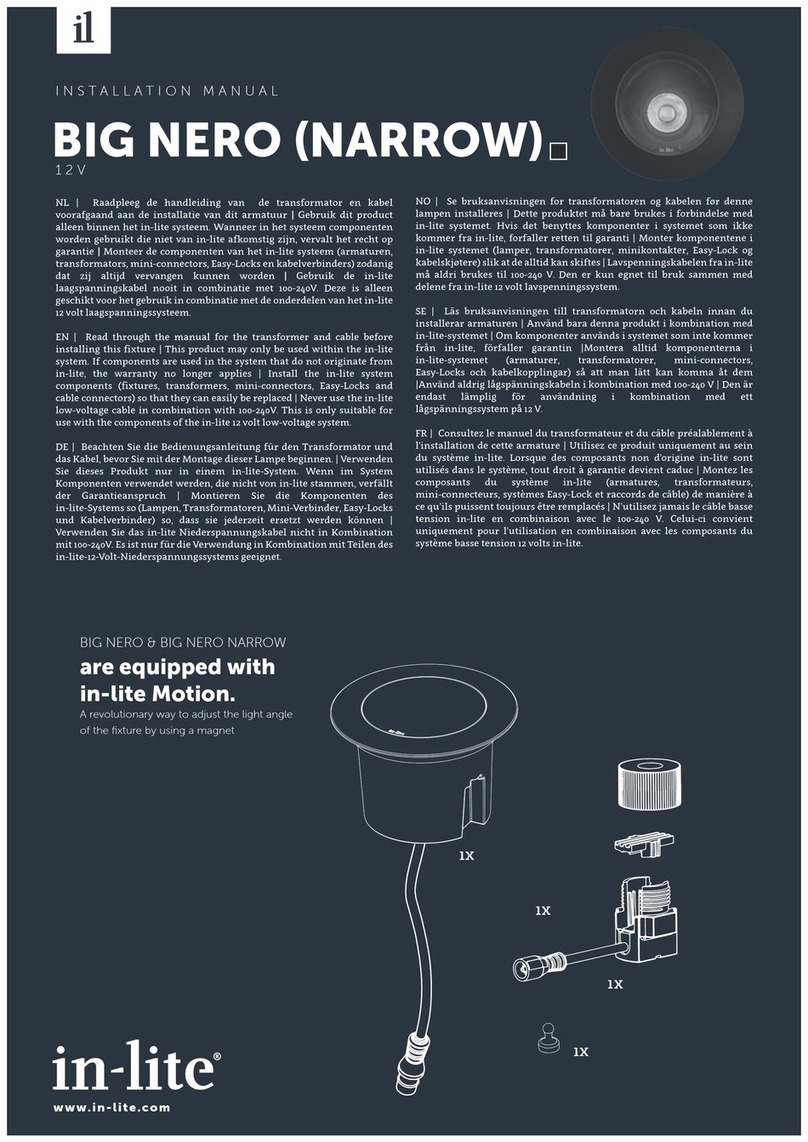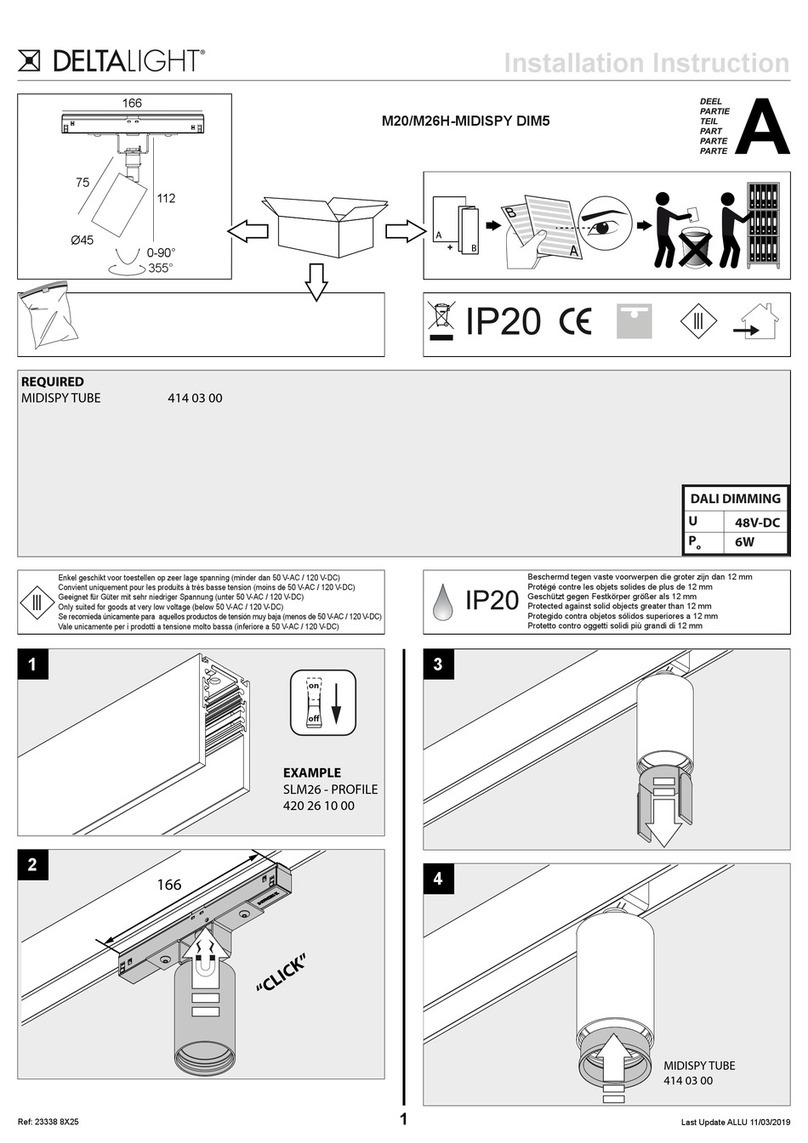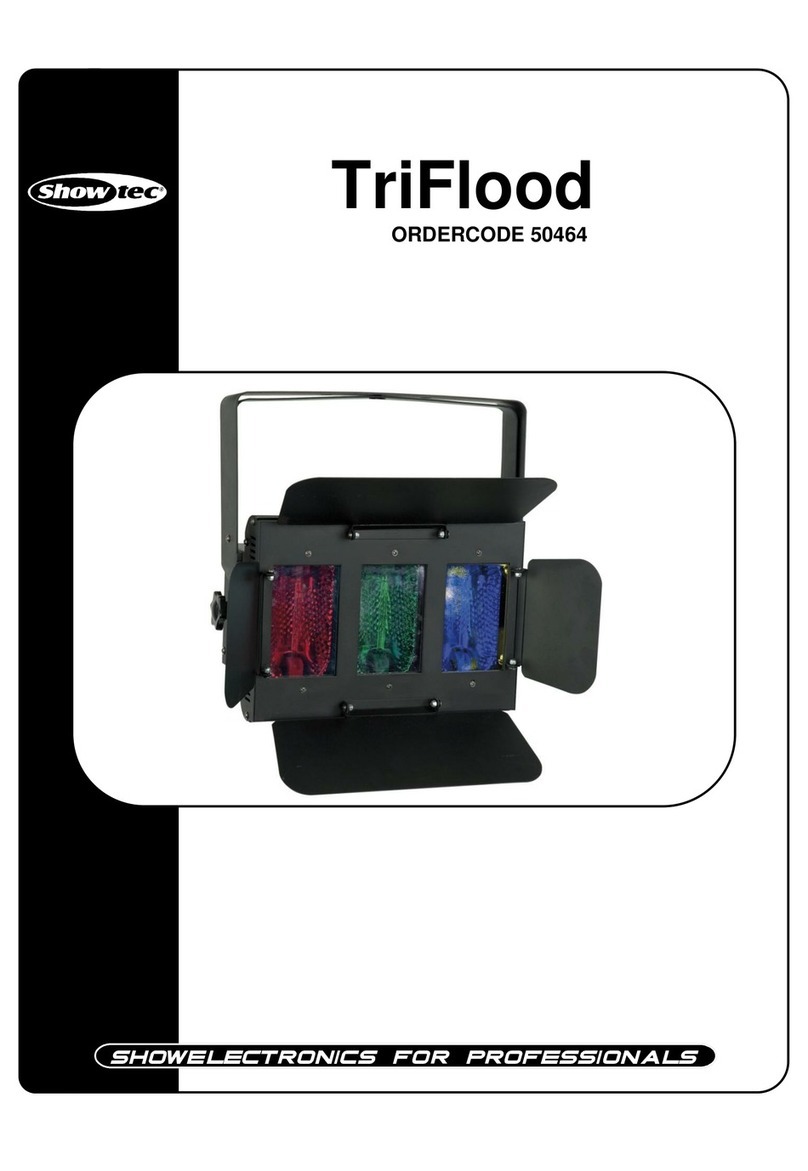Theatrelight TL-Z1000 User manual

Test Key and Test LED behaviour
Pressing the Test key:
Flashes the intensity or rate of the current effect to Full, and cancels held DMX levels
Holding for more than 3 sec on Wireless DMX 1000s, unlinks the receiver from its transmitter
The Test key has an internal blue LED which:
Mimics the intensity of the 1000 light output in non-Wireless DMX versions
Acts as a Link indicator in 1000s fitted with Wireless DMX (see Wireless DMX Operation)
Excepting over-temperature states, the Test and Status indicators are set off 5 minutes after power
up, or a change to the back panel controls.
Hiding the Instructions
A short form copy of the 1000 instructions is printed as a reminder on one side of the top lid of the
1000. To hide or show the instructions:
Depress the lid latch, slide the top lid out, turn it upside down, then slide it back in
Focus Knob Lock adjustment
If required the locking tension of the focus knobs may be adjusted:
Set the the focus knob in the lock position by turning it so it points either forward or back
Turn the screw in the centre of the focus knob slightly to adjust the locking tension
Focus Slide Friction adjustment
If required the focus slide friction may be adjusted:
Slide the top lid back to access the condensor lens, or slide the zoom lens lids
Turn the cam at the base of the lens tray with a flat blade screwdriver to adjust the slide action
Slide the top lid back into place
Tilt Friction adjustment
If required, the permanent tilt friction (with the tilt lock loose) may be adjusted:
Slacken the tilt knob, then pull the cap off the left yoke nut
With an M8 spanner, adjust the left yoke nut to the required friction, then replace the cap
Yoke osition adjustment
If required the yoke may be moved:
Slacken the tilt knob, then pull the cap off the left yoke nut
With an M8 spanner, undo the left yoke nut so the yoke can slide forwards or backwards
When in position, adjust the left yoke nut to the required friction, then replace the cap
Changing Lenses
To remove any of the three 1000 lenses for cleaning or changing:
Slide the top lid back to access the condensor lens, or slide the zoom lens lids
Turn the top lens clips clear of the lens, push the lens top back, then remove it
Reverse the process to install a lens. The grooved side of every lens must be to the front.
Cleaning the Z1000
For maximum optical and electrical efficiency and long life, the 1000 must be kept free of dust:
Blow any dust out of the interior of the 1000, fan blades, and heatsink fins
Clean all lenses and the LED module lens with a damp lint-free cloth
Don’ts
Do not connect the Z1000 to a dimmed mains supply
Do not use any solvent other than water to clean the lenses
Do not subject the 1000 to excessive force or shock
Do not operate the 1000 in wet conditions
Do not attempt to repair the 1000 in case of faults - return it to your sales agent
This product is not for domestic use
Contact Details
Theatrelight New ealand Theatrelight Asia
665D Gt South Rd Auckland N QianLong Industrial District, SanXiang, hongShan, PRC
phone ++64 9 622-1197 phone ++86 7608 632-0516
TL- 1000 oom Profile Spotlight Operators Manual
The TL- 1000 is an LED oom Profile spotlight suitable for general lighting in theatres and TV studios,
and for exhibition and display in art galleries and museums. This manual applies to the 1000 one colour
model, the 1000 2C two colour tuneable white model , and the four colour RGBW model.
Back anel View
ower Connection
The 1000 requires a non-dimmed power supply of rated voltage marked on the back panel.
Operating the Z1000 on a dimmed power supply will void your warranty
Plug the supplied power cable between the 1000 IEC socket and a power supply
Ensure the power supply is rated within the limits on the 1000 back panel
Ensure the power supply has an effective Earth connection
Standalone Operation all models
When DMX is not connected, the finger settable Level knob controls the intensity/rate of the
fade/effects function set by the Mode switch. Standalone operation is useful for permanent lighting
or effects, or for local On/Off control when focussing:
Set the Mode Switch for the following effects:
1: Fade matches 250 w tungsten bulbs 2: Fade matches 500 w tungsten bulbs
3: Fade matches 1 Kw tungsten bulbs 4: Fade matches 2 Kw tungsten bulbs
5: Fade matches 5 Kw tungsten bulbs 6: Fire fade/flicker effect: Off, slow/dim to fast/bright
7: Ramp cycle 10 minutes to 0.5 sec 8: Random flash effect: Off, slow/dim to fast/bright
9: Strobe flash effect: Off, 1 to 25 flashes per sec
Adjust the Level knob to set the intensity or rate of the effect
Press the Test key to test at Full the intensity or rate of the effect
RGBW Standalone Operation
The 1000 RGBW model has built-in colour selections for operation in stand-alone mode (ie without
a DMX control panel). For details see the leaflet “TL Luminaires 4 Colour RGBW Standalone Modes”.

DMX Single Channel Operation
If DMX is connected, then the highest of the DMX Start Channel (DMX 1) and the Level knob
controls the intensity/rate of the fade/effects function set by the Mode switch:
Plug a DMX cable from a control panel into the XLR (or RJ45) connector labelled ‘DMX In’
Link the DMX signal to other 1000s using the ‘DMX Out’ connector if required
Set the DMX Start Address switch to the required DMX address
Set the Mode Switch for the following effects:
1: Fade matches 250 w tungsten bulbs 2: Fade matches 500 w tungsten bulbs
3: Fade matches 1 Kw tungsten bulbs 4: Fade matches 2 Kw tungsten bulbs
5: Fade matches 5 Kw tungsten bulbs 6: Fire fade/flicker effect: Off, slow/dim to fast/bright
7: Ramp cycle 10 minutes to 0.5 sec 8: Random flash effect: Off, slow/dim to fast/bright
9: Strobe flash effect: Off, 1 to 25 flashes per sec
On the control panel, adjust the DMX level to control the intensity or rate of the effect
Set the Level knob above zero if a permanent minimum intensity/rate is required
Press the Test key to test at Full the intensity or rate of the effect
DMX Remote Operation
If DMX is connected and the Mode Switch is set to 0, the DMX panel can control the intensity and
the effects mode, and in two colour and RGBW models the individual colour levels as well:
Z1000: DMX1 Master; DMX2 Effects mode
Z10002C: DMX1 Master; DMX2 Warm; DMX3 Cool; DMX4 Effects mode
Z10004C: DMX1 Master; DMX2 Red; DMX3 Green; DMX4 Blue; DMX5 White; DMX6 Effects mode
In each model the last DMX: channel sets the Effects mode:
Plug a DMX cable from a control panel into the XLR connector labelled ‘DMX In’
Link the DMX signal to other 1000s using the ‘DMX Out’ connector if required
Set the DMX Start Address switch to the required DMX address
Set the Mode Switch to 0 for remote operation
On the control panel, set the Effects DMX level (DMX 2, 4 or 6) to select the following effects:
0-10%: Fade matches 250 watt tungsten bulbs
20%: Fade matches 500 watt tungsten bulbs
30%: Fade matches 1 Kw tungsten bulbs
40%: Fade matches 2 Kw tungsten bulbs
50%: Fade matches 5 Kw tungsten bulbs
60%: Fire fade/flicker effect: Off, slow/dim to fast/bright
70%: Ramp cycle 10 minutes to 0.5 sec
80%: Random flash effect: Off, slow/dim to fast/bright
90-100%: Strobe flash effect: Off, 1 to 25 flashes per sec
On the control panel, adjust the Master DMX 1 level to control the intensity or rate of the effect
For 2 colour models adjust DMX 2 and 3 to set the individual Warm/Cool levels
For RGBW models adjust DMX 2, 3, 4 and 5 to set the individual RGBW levels
Set the Level knob above zero if a minimum Master intensity/rate is required
Press the Test key to test at Full the intensity or rate of the effect
Wireless DMX Operation
The 1000 can be supplied fitted with a Wireless DMX receiver able to receive either Lumen Radio
or Wirelesss Solutions (WDMX) transmissions. A wireless DMX signal takes instant priority over any
cable DMX signal. If the Wireless DMX fails, the 1000 reverts to the cable DMX signal if present.
To link currently powered On but unlinked 1000s to the transmitter, follow the instructions
provided with the transmitter (usually a short press of the transmitter link key)
To unlink an 1000 from its transmitter, press the Test key for 3 seconds: the 1000 reverts to
the cable DMX signal (if any) within 1 second
In 1000s fitted with Wireless DMX, the Blue LED in the Test key indicates:
Blue LED Off: Not linked
Blue LED 100ms On/Off: Linked, Transmitter Off
Blue LED 1000ms On/100ms Off: Linked, Transmitter On, DMX Off
Blue LED On: Linked, Transmitter On, DMX On
The Blue LED is set off 5 minutes after power up or a change to the back panel controls.
The selected DMX Start Address is valid for both Wireless and Cable DMX.
Focus and Shutters adjustment
The 1000 has two focus knobs at the right front of the body. To focus the lenses:
Unlock the focus knobs by turning them to point down
Set the lenses close together for a wide beam, set them apart for a narrow beam
Move either or both lenses to focus on the shutters
Adjust the four shutters to shape the beam
Lock the focus knobs by setting them horizontal
Condenser Lens adjustment
The 1000 has an adjustable condensor lens behind the shutters:
Adjust the condensor focus knob for maximum even lighting, or a hotspot as required
Gobo fitting
The 1000 has a slot for a standard “B” sized Gobo, sited just in front of the shutters:
Slide forward the top lid in front of the shutters, fit the Gobo into its runners
Close the lid, then focus as required
Tilt adjustment
The 1000 is fitted with a tilt lock knob on the right side of the yoke:
Turn the tilt knob anticlockwise half a turn, then adjust the tilt position
Turn the tilt knob clockwise to lock the tilt position
an adjustment
The 1000 is supplied with an M10 bolt, wing-nut, flat washer, split washer, and friction washer:
Fit the composition friction washer between the 1000 yoke and its hook clamp
Fit the flat washer on top of the hook clamp, then the split washer and wingnut
Set the pan position, then tighten the wingnut to the required tension
Colour Frame fitting
Each 1000 is supplied with a colour frame which accepts standard colour filter sheet:
Fit the colour frame in the inner slot of the 1000 colour runners
Set the colour frame latch forward to prevent the colour frame falling out
DMX Fail behaviour
If the Wireless DMX signal fails, the 1000 reverts to the cable DMX signal. If the cable DMX signal
fails, the 1000 maintains the previous DMX levels for 10 minutes before fading out over 5 minutes
for Modes 1-5, or instant off for Modes 6-9.
Status LED indications
The Status LED shows the status of the DMX signal (Green) and the internal Temperature (Red):
DMX (Green): On = DMX OK; Flash = DMX errors; Off = No DMX (for 5 mins after power on)
Temperature (Red): Blink = >60C; On = >65C; Flash = >70C; Off = Normal temperature
If the 1000 is above 65C, the LED level is faded down slowly, and faded back in when cooler.
Popular Spotlight manuals by other brands
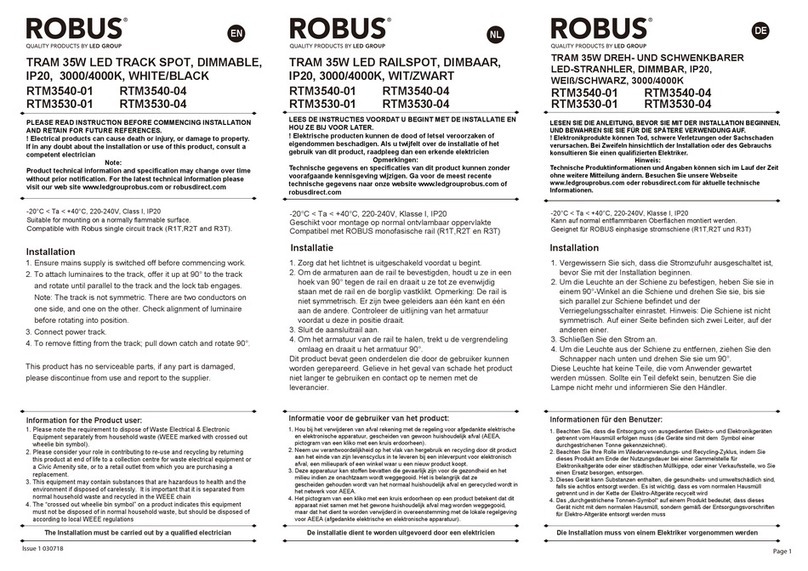
LED Group
LED Group Robus RTM3540-01 manual
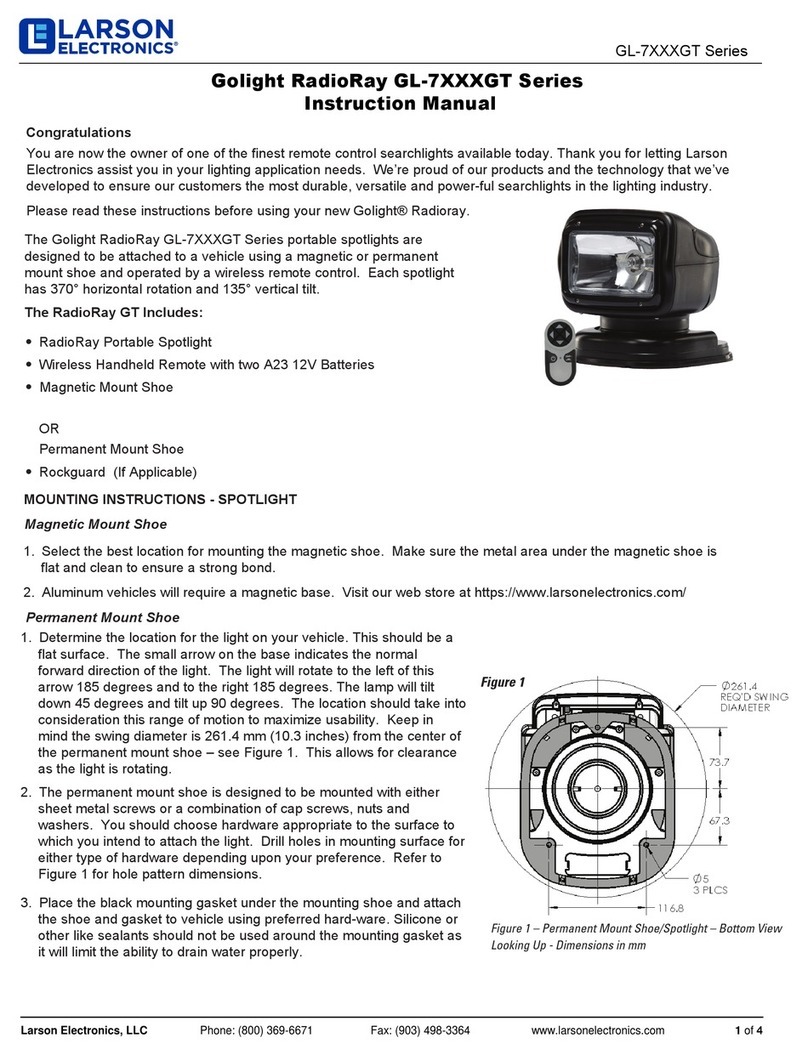
Larson Electronics
Larson Electronics Golight RadioRay GL-7 GT Series instruction manual
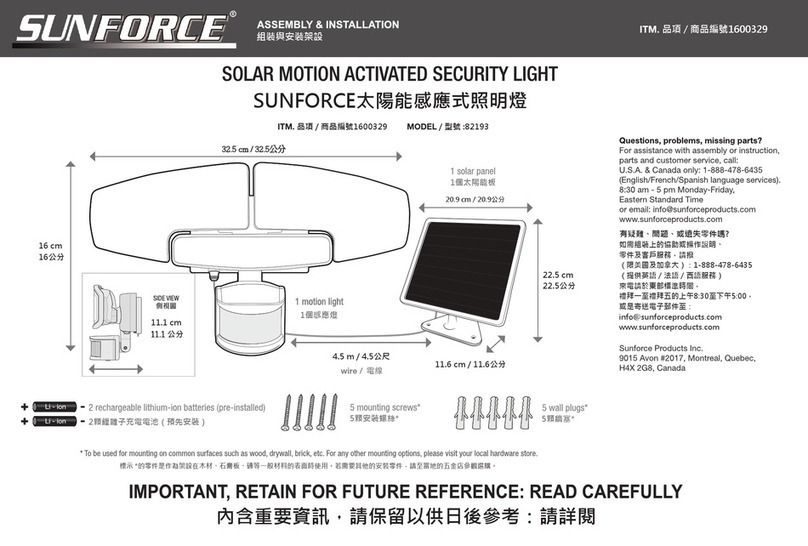
Sunforce
Sunforce 82193 quick start guide
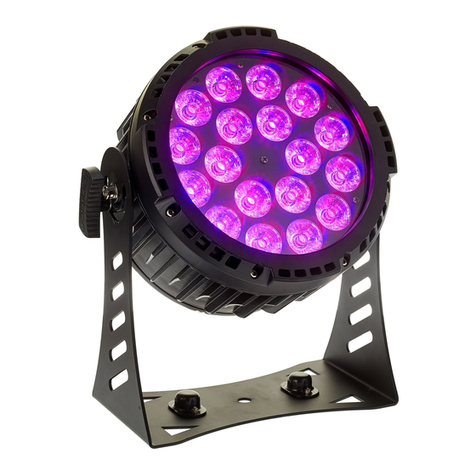
thomann
thomann Ignition 2bright Par 18 IP user manual
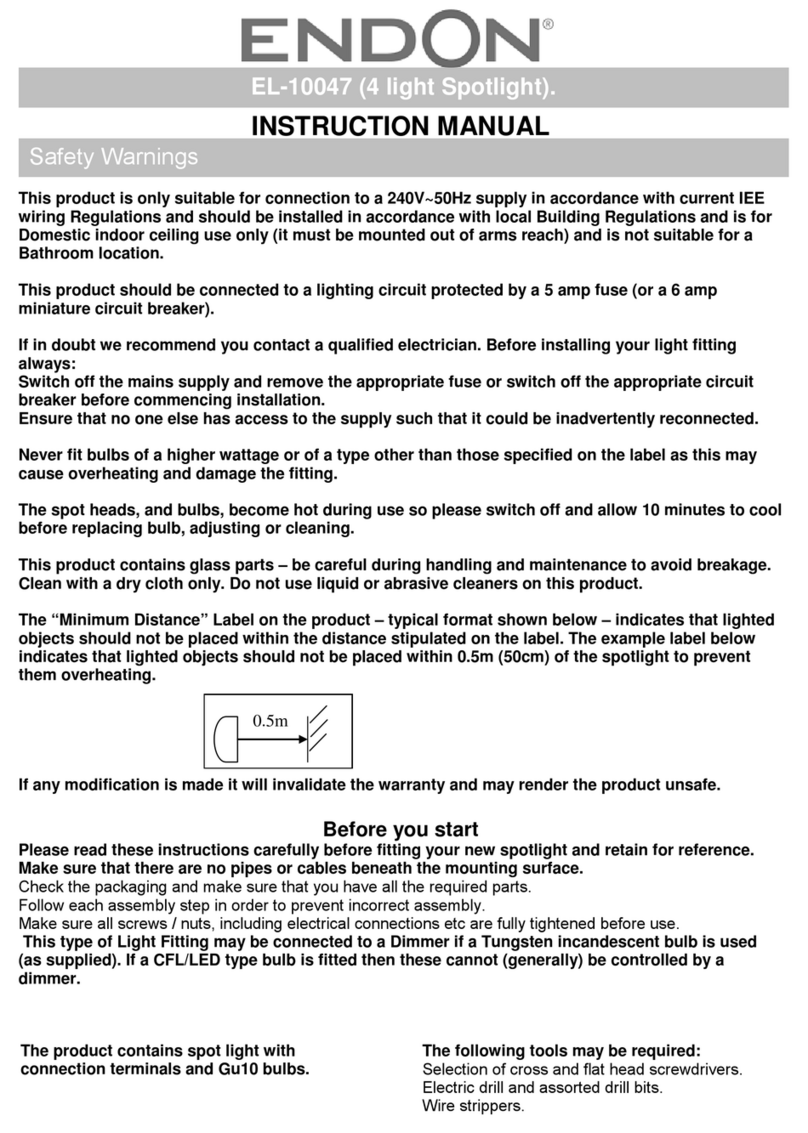
Endon
Endon EL-10047 instruction manual
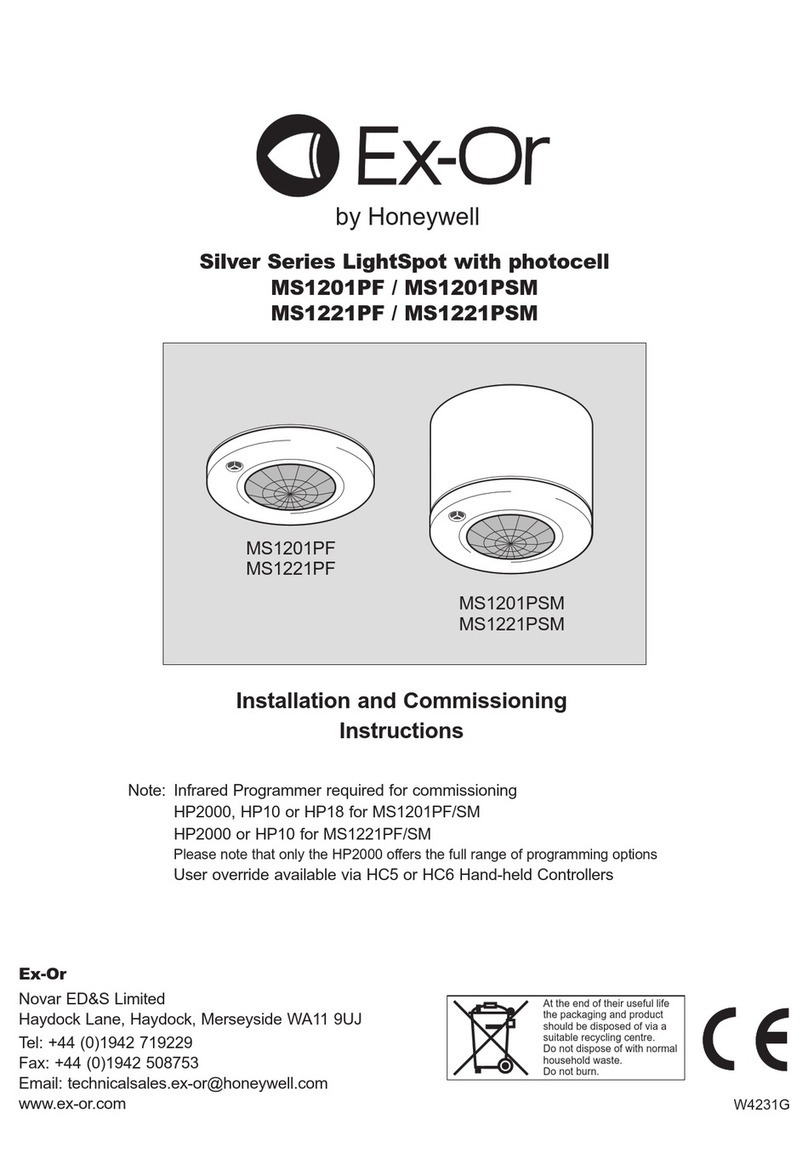
Honeywell
Honeywell Silver Series Installation and commissioning instructions
